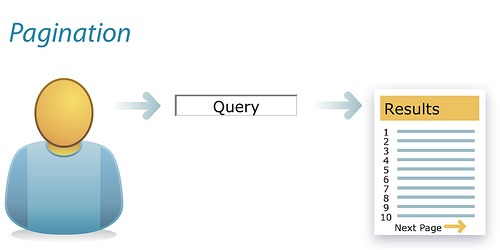Perhaps one of the more troubling conundrums that SEO's face is canonicalization. Running a close second is pagination.
Here's An Example
You have an e-commerce website and you want to rank for "beach towels". Currently, you have a category page that points to a section where all your beach towel products are organized and displayed. Technically, this is archived and updates whenever you add a new towel that is beach related.
Starting out, it is just one page. But as you begin adding more products, the page lengthens until, you have a page 2...then page 3...then page 4....and so on. The problem becomes technical because although page 4 is relevant to page 1, page 1 (the one you are optimizing for "beach towels", isn't getting the ranking love. Each page could technically be ranked for beach towels.
To make it even more complex, a typical user can drill down deeper into your website by using parameter based filters (beach towels under $10, blue beach towels, etc.)
Finally, and equally important, pagination could create potential issues in regards to crawl depth and thin, near duplicate or duplicate content.
So What Is The Solution?
There are a few options to consider.
- Add a "show all" link and then redirect all the paginated pages to the page with all the products on it.
The caveat to this is it must load quickly. I've seen hard line recommendations for the page to load within 3 seconds. This isn't for SEO though but user experience (which is equally as important) - If your website is using AJAX don't cut the search engine crawlers off
AJAX allows the visitor to never leave the page when they click to the next page producing a seamless effect. (It's also responsible for things like infinite scroll) This is a bit trickier as a crawler will not follow anything beyond a "#" hash tag. Technically, the user sees the pagination but the crawler doesn't have to index page 2, page 3, page 4, etc. because the items are all seen as one page. More on this can be found here. - Utilize HTML 5's latest rel="next" and rel= "prev"
The purpose of this canonical property is when you have a series of pages all directly linked to each other in terms of likeness. So, if you have 5 pages which all serve your list of "beach towels", this fix would make all 5 pages synonymous with page #1, potentially helping the crawlers understand that the first page is the one that should be listed in search. - Add "NoIndex, Follow" to sibling pages in a series
Another option would be to make it so the pages after your page that is optimized for "beach towels" aren't indexed at all. This can be done with the "noindex" command. The problem comes that you still want the links within the pages that aren't indexed to be followed by the crawlers (hence, the follow command).
So Many Choices, Which One To Follow?
The truth is that fixing pagination and canonical issues is subject to different criteria and therefore an SEO's challenge is based case by case. Here are a few scenarios for you:
- All the content is relevant (a series) but aside from the first page, none of it needs to be indexed.(solution?- Noindex, follow)
- All the content is relevant (a series ) and needs to be indexed. (solution?- If it loads within 3 seconds, rel="canonical"...if it doesn't, "rel="prev/next".
- All the content is relevant (a series) but thin, duplicate or near duplicate content- (solution?- create a one page view all page and then point them to the page using rel="canonical")
- All the content is relevant and unique within the series (solution?- "rel=prev/next).
- The website uses parameters/ filters in search- (solution? "rel=prev/next". If the parameters change the results, canonicalize to non-parameterized URLs)


